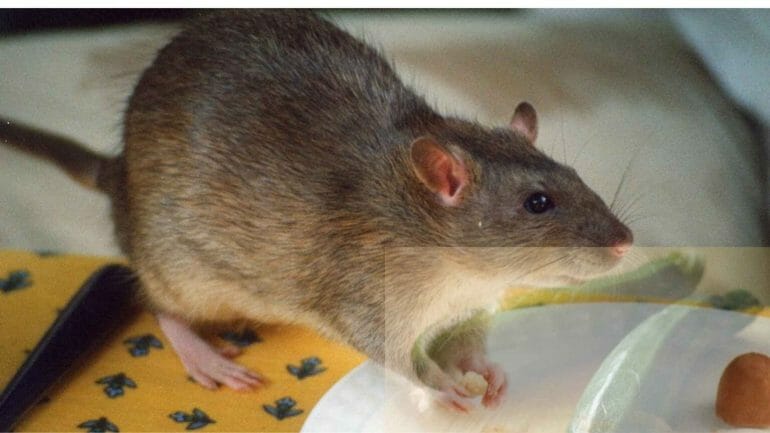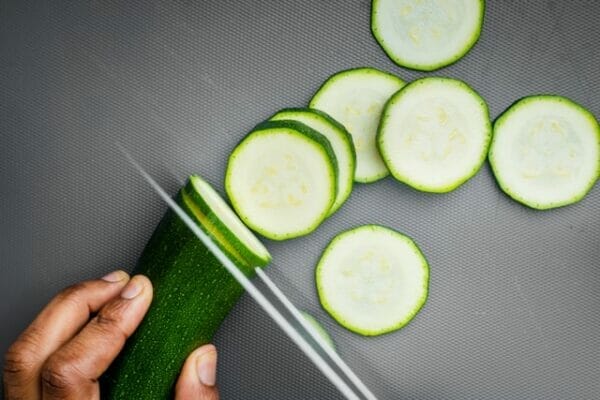Yes, rats can eat zucchini, as it is a safe and healthy vegetable for them. Zucchini is low in calories and high in dietary fiber, making it a nutritious addition to their diet.
However, it is important to feed rats zucchini in moderation, as excessive consumption may lead to digestive issues.
Always ensure that the zucchini is fresh and free from any pesticides or contaminants before offering it to your pet rat.

Nutritional Value of Zucchini for Rats
Zucchini, also known as courgette, is a widely consumed vegetable that belongs to the Cucurbitaceae family. While it is commonly enjoyed by humans, you may wonder if it is safe and healthy for rats to consume as well. In this section, we will explore the nutritional value of zucchini for rats.
1. Vitamins and Minerals:
Zucchini is a nutrient-dense vegetable that offers various vitamins and minerals essential for overall health. It is rich in vitamin C, which is known for its immune-boosting properties and antioxidant effects. Additionally, zucchini provides vitamins A, K, and E, which are vital for maintaining healthy eyesight, blood clotting, and skin health, respectively. The vegetable also contains minerals like potassium, manganese, and magnesium, which play a crucial role in the proper functioning of bodily systems.
2. Fiber Content:
Fiber is an essential component of a healthy diet, and zucchini is a good source of dietary fiber. Fiber helps promote digestive health by adding bulk to the stool and preventing constipation. It can also help regulate blood sugar levels and lower cholesterol levels in rats. Including zucchini in your rat’s diet can aid in maintaining a healthy digestive system.
3. Hydration:
One of the significant advantages of zucchini is its high water content. Rats need to stay hydrated to support their bodily functions, and zucchini can contribute to their overall water intake. Including zucchini in their diet can help prevent dehydration and ensure they are properly hydrated.
4. Low-Calorie Option:
Rats, like humans, need a balanced diet to maintain a healthy weight. Zucchini is a low-calorie vegetable, making it an excellent choice for rats who need to watch their calorie intake. By incorporating zucchini into their diet, you can provide them with a nutritious option without worrying about excessive calorie consumption.
5. Antioxidant Properties:
Zucchini contains antioxidants such as beta-carotene and lutein, which help protect the body against cell damage caused by free radicals. These antioxidants can contribute to overall health and may have a positive impact on the longevity of rats.
It is worth mentioning that while zucchini can be a healthy addition to a rat’s diet, it should be given in moderation and alongside a balanced diet. As with any food, it is essential to introduce new items gradually and monitor your rat’s response to ensure they tolerate it well.
In summary, zucchini offers various nutritional benefits for rats, including vitamins, minerals, fiber, and hydration. Its low-calorie nature and antioxidant properties make it a favorable choice for maintaining a healthy diet for rats. However, it is crucial to consider your rat’s individual dietary needs and consult with a veterinarian if you have any concerns about their diet.

How to Safely Introduce Zucchini into a Rat’s Diet
Introducing new foods into a rat’s diet is an important step in promoting their overall health and well-being. Zucchini, with its high nutritional value, is a great addition to their diet. However, it is essential to introduce new foods gradually to avoid any digestive issues or adverse reactions. In this section, we will discuss the steps to safely introduce zucchini into a rat’s diet.
1. Choose Fresh and Organic Zucchini
When incorporating zucchini into your rat’s diet, it is crucial to choose fresh and organic produce. This ensures that your rat consumes a high-quality vegetable without any harmful chemicals or pesticides. Fresh zucchini provides maximum nutritional benefits to your furry friend.
2. Wash and Prepare the Zucchini
Prior to introducing zucchini to your rat, it is important to wash it thoroughly to eliminate any dirt or bacteria. You can do this by rinsing the zucchini under cool running water and gently scrubbing the skin. Once washed, remove the ends of the zucchini and chop it into small, rat-sized pieces. Remember to remove any seeds as they can be potential choking hazards.
3. Start with Small Portions
When introducing zucchini into a rat’s diet, start with small portions to allow their digestive system to adjust. Offer a small piece of zucchini as a treat or mixed with their regular food. This gradual approach helps prevent any stomach upset or digestive disturbances.
4. Monitor for Any Reactions
Observing your rat for any adverse reactions or allergies is crucial during the introduction of zucchini. Keep an eye out for any signs of digestive upset, such as diarrhea or vomiting. If you notice any negative reactions, discontinue feeding zucchini and consult a veterinarian.
5. Increase the Amount Gradually
Once your rat has successfully tolerated small portions of zucchini, you can gradually increase the amount over time. Monitor their digestion and overall health during this process. Remember to maintain a balanced diet by incorporating other fruits, vegetables, and protein sources recommended for rats.
6. Variety is Key
While zucchini is a nutritious addition to a rat’s diet, it is essential to provide a variety of vegetables and fruits to ensure a well-rounded nutritional intake. Rotate zucchini with other rat-friendly vegetables like carrots, bell peppers, and leafy greens to keep their diet interesting and diverse.
7. Freshness and Hygiene
Always offer fresh zucchini to your rat, discarding any leftovers within a few hours. Additionally, ensure that the food and water containers are regularly cleaned to maintain hygiene and prevent bacterial growth.

Creative ways to incorporate zucchini into a rat’s diet
Zucchini is a versatile vegetable that is not only delicious but also packed with essential nutrients. When it comes to feeding your pet rat, incorporating a variety of vegetables into their diet is important for their overall health. Zucchini can be an excellent addition to your rat’s diet, and here are some creative ways to include it:
1. Zucchini slices:
One of the simplest ways to incorporate zucchini into your rat’s diet is by offering them raw zucchini slices. Rats enjoy the crunchy texture, and the mild flavor of zucchini makes it a great choice. Just wash the zucchini thoroughly, slice it into thin slices, and offer it as a snack or a part of their meal.
2. Zucchini puree:
If your rat prefers softer textures, you can try making a zucchini puree. Steam or boil the zucchini until it becomes soft and then blend it until it forms a smooth puree. You can serve this puree as a dip or mix it with their regular food to add some extra nutrients.
3. Zucchini noodles:
Zucchini can also be spiralized into noodles, also known as “zoodles.” Rats love the texture of zoodles, and it can be a fun and healthy way to add some variety to their meals. You can serve the zucchini noodles raw or lightly sauté them for a warm treat.
4. Zucchini muffins:
If you’re feeling a bit more adventurous, you can try making zucchini muffins for your rat. There are plenty of rat-friendly recipes available that use zucchini as one of the main ingredients. These muffins can be a tasty and nutritious treat that your rat will love.
5. Zucchini chips:
Zucchini chips can be a great alternative to unhealthy, processed snacks for your rat. Slice the zucchini into thin rounds, season them with a rat-safe herb or spice, and bake them in the oven until they become crispy. These homemade zucchini chips are not only delicious but also much healthier.
6. Zucchini and rat-friendly vegetable stir-fry:
You can create a rat-friendly vegetable stir-fry by sautéing zucchini along with other rat-safe vegetables like bell peppers, carrots, and broccoli. Add a bit of olive oil for cooking and serve it as a warm and nutritious meal option for your rat.
In summary, incorporating zucchini into your rat’s diet can provide them with essential nutrients and add variety to their meals. Whether you choose to offer zucchini slices, make a puree, create zoodles, bake muffins, prepare chips, or include it in a rat-friendly stir-fry, your furry friend is sure to enjoy the addition of this versatile vegetable.
Other Fruits and Vegetables Rats Can Eat Along with Zucchini
Rats, being omnivorous creatures, can consume a variety of fruits and vegetables in addition to zucchini. Including a diverse range of produce in their diet ensures that rats receive a balanced and nutritious meal. Here are some other fruits and vegetables that you can offer to your pet rat:
1. Apples:
Apples are a safe and healthy option for rats. However, it’s important to remove the seeds and core before offering them to your pet, as the seeds contain trace amounts of cyanide, which can be harmful to rats.
2. Bananas:
Bananas are a great source of essential nutrients like potassium and vitamin C. Rats usually enjoy the taste of bananas, making them a popular choice among pet rat owners.
3. Carrots:
Carrots are packed with vitamins and minerals, making them a nutritious option for rats. They are also crunchy, which can help keep your pet rat’s teeth healthy and prevent overgrowth.
4. Blueberries:
Blueberries are rich in antioxidants and can provide a boost to your pet rat’s immune system. You can offer them as a treat or mix them with other fruits for a wholesome snack.
5. Broccoli:
Broccoli is a cruciferous vegetable that is highly nutritious for rats. It contains vitamins, minerals, and fiber, which can contribute to your pet’s overall well-being.
6. Grapes:
Grapes should be offered to rats in moderation, as they are high in sugar. However, they provide a good source of hydration and can be a tasty treat for your pet.
7. Spinach:
Spinach is a leafy green vegetable that rats can enjoy. It is a rich source of iron and other essential vitamins, which helps support your pet rat’s overall health.
8. Peas:
Peas are a good source of protein for rats. They are also rich in vitamins and minerals that contribute to your pet’s well-being. You can offer them fresh or frozen, but make sure to thaw them before feeding.
9. Oranges:
Oranges are a citrus fruit that rats can consume in moderation. They are high in vitamin C and can be a refreshing addition to your pet rat’s diet.
10. Cucumbers:
Cucumbers are mostly composed of water and can be a hydrating option for rats. They are low in calories and can be a good choice for overweight or diabetic rats.
Remember to introduce new fruits and vegetables to your pet rat’s diet gradually to avoid digestive upset. It’s also important to wash all produce thoroughly before offering it to your pet to remove any pesticides or contaminants. Providing a varied and balanced diet will help keep your pet rat healthy and happy.
1. Can rats eat zucchini?
Yes, rats can eat zucchini. It is a safe and healthy vegetable for them to consume. However, it should be given to them in moderation as a treat and not as a primary part of their diet.
2. How often should I clean my pet rat’s cage?
You should clean your pet rat’s cage at least once a week. This includes removing all bedding, scrubbing the cage with a mild detergent, and replacing the bedding with fresh material. Regular cleaning helps maintain a clean and hygienic living environment for your pet rat.
3. Can rats be litter trained?
Yes, rats can be litter trained. By providing a litter box in their cage and consistently placing their droppings in it, rats can learn to use it as their designated bathroom area. However, it may take some time and patience to successfully train them.
Conclusion
In conclusion, rats can indeed eat zucchini. Zucchini is a safe and nutritious vegetable that can be included in a rat’s diet.
It offers a good source of vitamins and minerals, including vitamin C and potassium, which are essential for a rat’s overall health.
However, it is important to remember that zucchini should be served in moderation as part of a balanced diet for rats.
Too much zucchini or any new food introduced too quickly can cause digestive issues in rats. It is always recommended to consult a veterinarian or a professional in rat nutrition to ensure that your pet’s dietary needs are adequately met.
